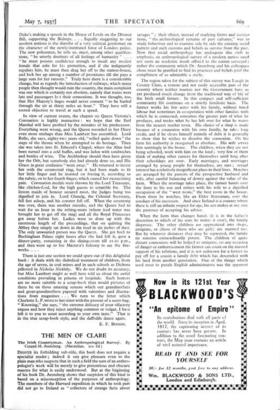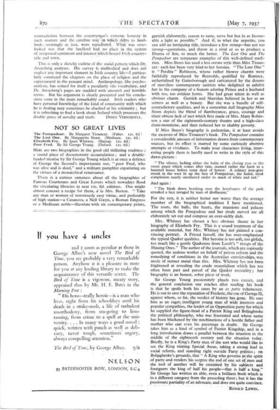THE MEN OF CLARE DEsPrrE its forbidding sub-title, this book
does not require a sPeCialiit reader ; indeed it can give pleasure even to the plain man who suspects that in such a field the sum of an anthro- pologist's work will be merely. to give Pretentious and obscure reasons for what is easily understood. But at the beginning of his .book Dr. Arensberg shows that suspicion of this kind is based on a misconception of the purposes" of anthropology. The members Of the Harvard expedition in which he took part did not -go to Ireland as "collectors of strange facts about
savages " ; their object, instead of studying forms and institu. tions, "the archaeological remains of past cultures," was to study behaviour and to examine side by side the existing social pattern and such customs and beliefs as survive from the past. Now that social anthropology has undergone this shift in emphasis, an anthropological survey of a modern nation need not seem an academic insult offered to the nation surveyed ; rather the community which Dr. Arensberg and his colleagues chose must be gratified to find its practices and beliefs paid the compliment of so admirable a study.
The region taken for the subject of this survey was Luogh in County Clare, a remote and not easily accessible part of the country where neither tourists nor the Government have as yet produced much change from the traditional way of life of the Irish small farmer. In this compact and self-sufficient community life continues on a strictly familistic basis. The farmer works his few acres with his family, without hired labour but sometimes in co-operation with other families with which he is connected, consumes the greater part of what he produces, and trades what he has left over for what he wants from the nearest market town. His choice of a shop is made because of a connexion with his own family, he takes long credit, and if he clears himself entirely of debt it is generally to show that he wishes to dissolve the connexion. On his farm his authority is recognised as absolute. His wife serves him untiringly in the house. The children, when they are not being schooled, work with him on the land ; very few of them think of making other careers for themselves until long after their schooldays are over. Early marriages, and marriages arranged by young peOple for themselves, are rare ; sexual interest has a relatively insignificant place in their lives. Matches are arranged by the parents of the prospective husband and wife, after careful balancing of dowry against the value of the farm. When the marriage takes place, the farmer hands over the farm to his son and retires with his wife to a dignified occupation of the "west room," the best room in the house. From there he watches, like an Elder Statesman, over the conduct of his successor. And since Ireland is a country where there is still an infinite respect for age, his son makes at any rate the pretence of accepting his advice.
When the farm thus changes hands (it is in the father's discretion to which of his sons he makes it over), the family disperses. The other children are apprenticed into shops, emigrate, or (those of them who are girls) are married too. But by whatever distances they may be separated, the family tie remains extraordinarily potent. The children of quite distant connexions will be helped to emigrate, on any occasion of danger or embarrassment the farmer can count on the massed support of his relations, and it is not unknown for a farmer to pay off for a cousin a family debt which has descended with his land from another generation. One of the things which used most to puzzle English administrators was the apparent
contradiction between the countrynpn's extreme honesty in such matters and the carefree way - !tvhich dehts to land- lords, seemingly as just, were repudiated. What. was over- looked was that the landlord had no place irt the system of reciprocal sentiment and interest Which bound Irish country- side and town.
This is only a sketchy outline of the social pattern which Dr. Arensberg analyses. His survey is methodical and does not
neglect any important element in Irish country particu- larly commend the chapters on the place of religion and the supernatural in the peasant mind. Anthropology, like psycho- analysis, has coined for itself a peculiarly vile vocabulary, and Dr. Arensberg's pages are studded with uncouth and horrible terms. But his argument is clearly presented and his conchi- sions seem in the main remarkably sound. Irish readers who have personal knowledge of the kind of community with which he is dealing may sometimes be abashed at his solemnity ; but it is refreshing to find a book about Ireland which possesses the double grace of novelty and truth. DEREK VERSCHOYLE.















































 Previous page
Previous page